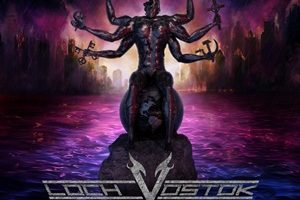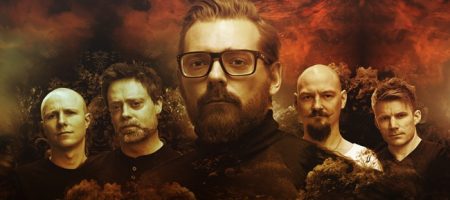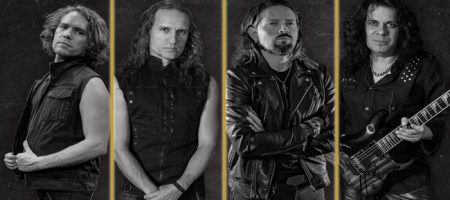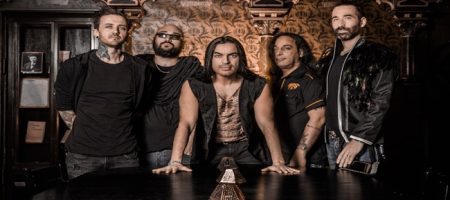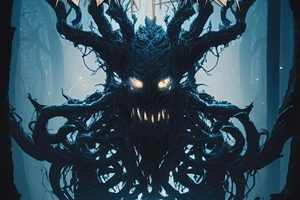Advocacy – Perseverance Through Decoherence
Sunday, 21st January 2024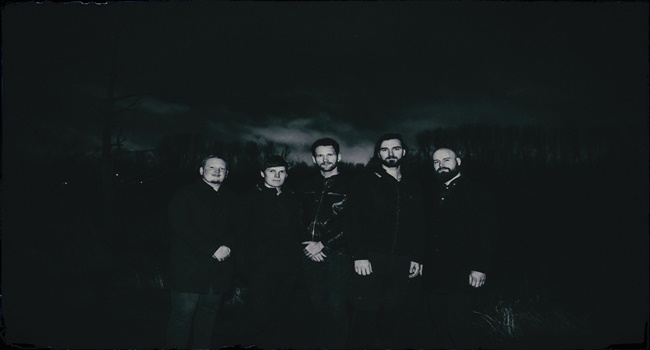
Progressive rock / metal may always be a niche style in terms of acceptance, but the following and exploration in terms of where musicians take these genres has never shined brighter as it has in the current scene. Danish group Advocacy enjoys the fruits of this creative energy through their debut album The Path of Decoherence – injecting their sound across decades of influences which contain pop, jazzy, hook-oriented nuances one minute, while more modern or extreme on other aspects, holding onto progressive rock/metal as the main backbone of their sound. We spoke with vocalist/guitarist Søren Kjeldsen and guitarist Søren Wind regarding the development of the band’s sound, the challenges that cropped up during the recording of the album, performance shots in the woods for their video shoot for “Star Formation”, what progressive music means to them as musicians, thoughts on climate change / personal responsibility, and future plans.
Dead Rhetoric: What do you remember about the formative times of Advocacy back in the spring of 2015? Did you know straight away the style of progressive metal you wanted to achieve, or was it a feeling out process through influences, rehearsals, and initial songwriting to arrive at your formula?
Søren Kjeldsen: This is the sort of question I can answer the best, as the other Søren (Wind) is the newest member, and I am the founding member. Back in 2015, I had been in a band that was more classic death metal, thrash metal. I was enjoying that, but I got more and more into experimental, progressive stuff. I got tired of the conventions of those genres, but I spent so many years trying to build myself up as a guitarist, I was very self-critical a lot of the years. When I finally decided I was done with my studies, a psychologist, I was going to turn into a grown-up, have a full-time job, and if I’m going to have any flexible time it’s now while I’m writing my master’s thesis. I just knew I wanted to do something that was more akin to the international bands than what I was used to here. There are some progressive bands but most of us listen to stuff like Opeth, Tool, and I wanted that kind of dynamic where it’s still dark and heavy, but not necessarily bound to death metal vocals. Progressive music gives me the opportunity to make something really heavy or death metal-ish, but perhaps in the same song or in a different song I can do things more melodic, more dynamic. I wanted to go from the extreme ends of the genre and go into something more hard rock, folk rock, or progressive rock.
Back when it was myself and other members at the time, some of them had song ideas but it was primarily driven on compositions that I wrote. I have a certain style, a certain kind of melodies and groove. I wanted to make something heavy but also to distance myself from the more extreme metal. Odd measures, longer songs, something that was groovy because I wasn’t that technical of a guitarist. I knew what limitations I had both vocally and musically at the time. This sounds like me, and that was very clear, but it has changed through the years from the band it was then to the band we are now. I’ve developed myself as a musician.
Dead Rhetoric: The Path of Decoherence is the latest studio album for the band. What can you tell us about the songwriting and recording sessions for this effort? Where do you see the greatest differences or growth between this effort and your two previous EP releases?
Søren Wind: I believe this (album) is a new outing. I’ve been in the band for the past year, so I’m very limited in what I’ve been able to contribute to the album.
Kjeldsen: This has been our most prolonged process. We started recording the drums all the way back in late 2022. We are happy with the way it turned out, but most artists will also, when they make their debut album, know what to do and what not to do for the next album. We had an idea from some songs and some themes to me I wanted everyone to participate. I had some songs, and some of the Peters’ (bassist Juelsgaard and guitarist Locher) also contributed. The EP’s were much more driven by the songs I wrote, but I want this current lineup to make everyone feel welcome to put the same level of musicianship and writing, it will be a much more collaborative effort. We recorded the drums first, and then we thought about if we were going to record this in a classic way booking a studio for a month. At that point, one of our guitarists was going abroad, he has a wife in China. The easiest way to do this was to use modern technology and record it ourselves, we all have these external hard drives. It gave him some creativity and time efficient freedom to do it, but it had a backlash because when we finally found Frederik Uglebjerg, he plays in some pop and prog bands, he had a very modern sound, and he wasn’t too expensive at the point we worked with him. If we wait another year, he would have been more expensive as he was getting busier.
We recorded it ourselves; he was the mixer and master of it. It worked, but there were a lot of errors, we would write guitars, playing these songs in concert or in our rehearsal room for a while, there are things you don’t notice until it’s recorded. The feel of guitars, whether we played something more palm-muted, or maximizing this note. Thankfully Frederik was very patient – he told us what didn’t work. There were a few re-recordings of things because we figured out certain things while we were making the album. We are very happy with how it turned out, but we also know now the next time we will sit down together, no one leaves the country and go through a more efficient demo making process. A lot more ambitious than the early EP’s, because the first EP was also headed by someone who was in the studio with us. I just realized for some parts on this album, we needed that external voice in the room. This is the age of DIY, but you need that producer dynamic in some kind of role. We got that, in a very prolonged, chaotic way at times.
Dead Rhetoric: The lyrics are based on topics of existentialism, societal issues, and the stormy depths of the human mind. What sources fuel your content – and are you working hand in hand with the musical movements to create specific types of emotional resonance or atmosphere through the lyrics and melodies?
Kjeldsen: When I figure out the vocals and the lyrics, it always starts with nonsense lyrics. There aren’t many bands where I really listen to the lyrics first – there are certain bands that get me hooked through a feeling. There are bands like Tool that have hidden meanings, but I don’t have the time to do that. We don’t want to make campy lyrics either, where you can rise and it’s like ‘ah’. We want to write something that feels genuine, not try to be more pretentious than its supposed to be. The lyrics I’ve written, the origin is we are a band of guys that although we are very different, we all go through these existential things with your love life, your own identity through life. I’m not a religious guy, I may have been one when I was a kid, I am now like how you have to balance things and create your own feelings, inspired more and more by my work as a psychologist.
The newer lyrics, it’s almost like a pocket version of some dynamic psychotherapy, work through the paradox of you actually want to be closer to someone but you do something that pushed people away. It’s an unconscious reaction that a lot of people can relate to. Being in some way your own designer of your misery. Work through that even though you are somewhat aware of it, you are also stuck in it. I try to acknowledge the dark part of existence and feelings but more and more after becoming a psychologist I want to make some glimpse of hope and development at the end. It’s the way I see the world more and more, you have to acknowledge all the shit and all the hardships, there’s also the path to make a change in some way. Either through existential belief, spiritual belief, or therapeutic work. I want things to be dark, but I don’t want things to be suicidal.
Wind: We are also very lucky that we have some bright minds within our band. We have Søren as a psychologist, we also have an astrophysicist, we can dive into some great subjects and write some great lyrics.
Dead Rhetoric: What can you tell us about the video shoot for the single “Star Formation”, directed by Casper Silber? How did you decide on the specific locations that were chosen, and what do you think of the visual medium in terms of promotion for the band?
Wind: It’s a great question. I believe Casper had a great deal in finding what suited the song. We needed to figure out how to record in some wooded area without disturbing people. We got the permission to play there in the end.
Kjeldsen: It was great to find a guy like Casper, who we met at one of our shows, he was doing some video promotion for this other band. He was pretty professional; a huge deal of this business is presentation. It’s something you have to make fun to do because it’s necessary. We had some good quality singles, but when we reach out to venues, promoters, other than the music itself, how can we show them a taste of what we are? Even though this was recorded in the woods, we had some bigger ambitions to begin with. We wanted to be much more symbolic with the theme of the song, because it has this post-apocalyptic (theme), before the sky breaks down. We wanted to have broken glass, but we don’t have the time or money to do this. We wanted this to be efficient, not too cringy, but ambitious. It flowed nicely, the visuals in the woods, there are some dynamics in the shots and how things are cut. He focused on certain movements to make it more like a performance video. He had a lot of experience beforehand. It’s a credit to Casper and his commitment to do this. We had fun even if we were disturbing some people and their rounds of disc golf.
Dead Rhetoric: How would you describe Advocacy when it comes to your live performances and philosophy on stage versus what people hear with your recordings? What have been some of your favorite shows to date?
Wind: For me personally, the best show might have been the one at the Death Island Festival. It was primarily because of the festival – it was great, even though it was the first year, they did things very well. The crowd was great, it was a great show and I really enjoyed it. Our performance is ever evolving. We are trying to get better all the time. That actually is something that we’ve been working on for the last several months. We are trying to get past the thing where we are some guys just sitting there on stage, doing some music that confuses people to be more of an energy bomb, in your face. It becomes more of an experience.
Kjeldsen: To add to that, the Death Island Festival was a huge high point for me personally. It was a part of Denmark that is in a small city area away from the big cities. The biggest city has developed more of a fatigue when it comes to all the shows that come through, when you are playing somewhere else where it’s the biggest event over a half year, people are really more into it. Also, because we are good. It was awesome, we want to get out through all of Denmark and into the rest of the world. By playing this kind of niche genre, you have to be in some way a music nerd yourself. It’s longer songs, and there are a lot of changes, to figure out that we would play in front of people that won’t know us very much, we got so much positive feedback afterwards so it gave an okay, even if we play ambitious progressive rock/metal, we can reach a bigger audience.
I agree with Søren, it’s a way that we are trying to figure out our own identity. We are geeks, I’m not going to be a front man that’s this cool death metal or hardcore vocalist. It’s not just me, I’m inspired more by people like Mikael Akerfeldt or Devin Townsend, charismatic but also having a humorous approach to their music. We can’t make excuses for it being technical, if we can’t do windmills on stage, what kind of dynamics can we play into on stage? This is the awesome part, without being too forced try to figure out a way that’s authentic to us being more dynamic on stage. We are getting there, but we have reached the point where we are able to feel safe and play this (music) well. Now we have to be more and more relaxed doing it.
Dead Rhetoric: What does progressive metal mean to you as a genre? Do you feel like there are parameters to what can be done, or has the definition broadened over the decades due to the varied influences and musicianship qualities that come into play?
Wind: For me, progressive rock and metal is this big space, a big void of different things that you almost can’t put a finger on, endless opportunities. I absolutely love that. Typically, it’s a difficult type of music. I believe that progressive music has started to turn into something a bit more generic than it started out to be. We see a lot of these djenty metal bands, and I love it – but progressive is much more than that. That’s also what I think we are trying to do with our band, there is much more to it than just djent stuff.
Kjeldsen: When I got into bands like Tool, Opeth, and Pain of Salvation, it was like you can do anything with this. You can do progressive vocals, funk, pop, to me it was like I could choose so many genres as there are so many aspects to progressive metal. It’s also paradoxical, because when I follow some various Facebook forums there are so many generations. If you go back to the early 60’s and 70’s progressive rock bands, some fans of those genres won’t even recognize progressive metal as a genre. And then progressive metal generations into Fates Warning and Dream Theater that do not like mixing things like Tool and Opeth. Everything all in between, because when I was young it was the middle of the 2000’s into the 2010’s – I wanted to bridge more of that old school, classic prog metal like I grew up with, but also trying to hybrid it with a more modern approach. A band like Haken, they still sound like a younger version of Dream Theater, but also have some djent riffs. They really nailed that old school process of experimenting with dynamic, progressive metal and bringing it into the 2020’s. We want to also build a bridge between the more classic style and the more modern aspects like Sleep Token. It’s a very diverse genre, but just as fragmented as everything else.
Dead Rhetoric: Where do you think the leaders of the world need to focus their attention, time, energy, and resources on the most for the greater good of more people on a global scale?
Wind: That’s a loaded question! (laughs). I know there are wars going on at the moment, which is terrible at the moment. I’m a firm believer that with the global warming we need to do some more work about this. I think as humankind we can do some more work.
Kjeldsen: I think we don’t talk that much about politics within the band. On a scale like Denmark, our society is based on a social, democratic platform. We have a welfare system that’s set up so that the government will never completely take that away. I’m very discouraged at the way things are now. I grew up when the internet was becoming more of a normal thing. I remember the hope that this would bring people to a more collective mindset, able to find evidence and scientific knowledge that would break all the borders. It’s the opposite of it, we have more of a village mentality. There are some issues, like the climate crisis and wars, they are a huge problem. I heard a program here in Denmark that talked about not being that many climate deniers, there are a lot more people saying they are doing something, but they aren’t really doing something. They debate so much about the best way to do things that nothing ever gets done. That worries me the most, it’s a sham. We will go backwards drifting around, with a lot of climate refugees. I get very alienated, there should be politicians or people who take more responsibility and be serious, we have to accept the challenge of the people’s votes, figure out a different way to educate people instead of pandering to racist shit, smoke bombs. It’s a big theme of just accepting things going down the toilet, so let’s make a concept album based on that.
Dead Rhetoric: What’s on the agenda for anything related to Advocacy over the next twelve months or so? Are there any other outside projects or side bands that you would also like to let people know more about and investigate?
Wind: We are trying to plan some gigs for next year, but it’s not easy. We want to play some gigs and get around the country and outside of Denmark to maybe Germany for example. And also write some new material, of course.
Kjeldsen: We want to be ahead, and it’s hard especially after the coronavirus, everything fills up. If you are a niche band in Denmark like we are, you don’t have as much to bargain with. I hope the response to the album will be strong enough to put us a few levels higher on the food chain, some more people may respond to our emails. We want to go for an international audience, because Denmark is so small. We hope to be a catalyst to this country more than just death metal or thrash metal, it’s possible to have a progressive metal band to succeed. This music speaks more broadly. The themes we portray without being too specific, a lot of people should be able to relate to in every part of the world.
We are writing new stuff. I want to make a new album. This era of Advocacy, we have made it – now we want to develop our sound, more power metal vibes, we have some black metal vibes. We know that we push boundaries – we want to play some of this stuff live to figure out what we are as a band live.











